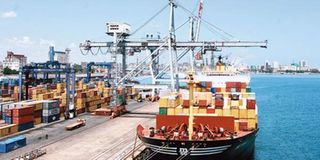Ports get Sh20bn scanners to combat illicit drug trade

Dar Port
What you need to know:
Works, Transport and Communications minister Makame Mbarawa graced the commissioning of the scanners - including a mobile vehicle system and one for Tanga Port – in Dar es Salaam yesterday.
Dar es Salaam. Tanzania Ports Authority (TPA) yesterday commissioned scanners at its two ports as it seeks to play an increasingly important role in combating the transporting of illicit drugs, illegal export of wild animals and tax evasion.
Works, Transport and Communications minister Makame Mbarawa graced the commissioning of the scanners - including a mobile vehicle system and one for Tanga Port – in Dar es Salaam yesterday.
Prof Mbarawa threatened to take stringent measures against TPA officials who will not exercise integrity when operating the newly acquired gantry and mobile scanners.
“We thank the government of China for the support of Sh20.2 billion which has enabled us to procure the three scanners,” he said.
However, he noted that without integrity the scanners would be useless and therefore called on the TPA chief to deal with anybody who will be seen not to operate the scanners accordingly. He urged TPA to have backup system that will retrieve information in case the system experiences any fault. Further, he said that the government would also install similar scanners in Mtwara, Kigoma and Mwanza ports to ensure efficiency. Chinese ambassador Lu Youqing said the Dar es Salaam Port attracts a lot of business from landlocked countries and therefore has the potential to boost the economy.
He noted that the government was losing revenues and illicit drugs were passing through the ports for lack of scanning.
He hopes the problems will now end following the procurement of the scanners. “We will continue to support Tanzania in its project aimed at improving the lives of its citizens,” he said.
TPA director general, Deusdedit Kakoko said the process of acquiring the scanners, started way back in 2013. “China has helped us acquire the scanners and trained our officials on how to operate them.”




